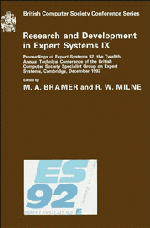Book contents
- Frontmatter
- Contents
- Preface
- Introduction
- CONSULTANT: providing advice for the machine learning toolbox
- A methods model for the integration of KBS and conventional information technology
- KBS methodology as a framework for co-operative working
- Project management for the evolutionary development of expert systems
- The specification and development of rule-based expert systems
- Towards a method for multi-agent system design
- Jigsaw: configuring knowledge acquisition tools
- On the relationship between repertory grid and term subsumption knowledge structures: theory practice tools
- Strategy maze: an on-line tool for support management of the knowledge acquisition process
- Concurrent engineering using collaborating truth maintenance systems
- Ockham's razor as a gardening tool
- A designer's consultant
- Fairness of attribute selection in probabilistic induction
- An application of case-based expert system technology to dynamic job-shop scheduling
- Neural network design via LP
- KEshell2: an intelligent learning data base system
- Approaches to self-explanation and system visibility in the context of application tasks
- An object oriented approach to distributed problem solving
- Intelligent user interface for multiple application systems
- Combining qualitative and quantitative information for temporal reasoning
- Documents as expert systems
Fairness of attribute selection in probabilistic induction
Published online by Cambridge University Press: 04 August 2010
- Frontmatter
- Contents
- Preface
- Introduction
- CONSULTANT: providing advice for the machine learning toolbox
- A methods model for the integration of KBS and conventional information technology
- KBS methodology as a framework for co-operative working
- Project management for the evolutionary development of expert systems
- The specification and development of rule-based expert systems
- Towards a method for multi-agent system design
- Jigsaw: configuring knowledge acquisition tools
- On the relationship between repertory grid and term subsumption knowledge structures: theory practice tools
- Strategy maze: an on-line tool for support management of the knowledge acquisition process
- Concurrent engineering using collaborating truth maintenance systems
- Ockham's razor as a gardening tool
- A designer's consultant
- Fairness of attribute selection in probabilistic induction
- An application of case-based expert system technology to dynamic job-shop scheduling
- Neural network design via LP
- KEshell2: an intelligent learning data base system
- Approaches to self-explanation and system visibility in the context of application tasks
- An object oriented approach to distributed problem solving
- Intelligent user interface for multiple application systems
- Combining qualitative and quantitative information for temporal reasoning
- Documents as expert systems
Summary
Abstract. In this paper, the problem of obtaining unbiased attribute selection in probabilistic induction is described. This problem is one which is at present only poorly appreciated by those working in the field and has still not been satisfactorily solved. It is shown that the method of binary splitting of attributes goes only part of the way towards removing bias and that some further compensation mechanism is required to remove it completely. Work which takes steps in the direction of finding such a compensation mechanism is described in detail.
Introduction
Automatic induction algorithms have a history which can be traced back to Hunt's concept learning systems (Hunt et al., 1966). Later developments include AQ11 (Michalski & Larson, 1978) and ID3 (Quinlan, 1979). The extension of this type of technique to the task of induction under uncertainty is characterised by algorithms such as AQ15 (Michalski et al., 1986) and C4 (Quinlan, 1986). Other programs, developed specifically to deal with noisy domains include CART (Breiman et al., 1984) and early versions of Predictor (White 1985, 1987; White & Liu, 1990). A recent review of inductive techniques may be found in Liu & White (1991). However, efforts to develop these systems have uncovered a problem which is at present only poorly appreciated by those working in the field and has still not been satisfactorily solved.
- Type
- Chapter
- Information
- Research and Development in Expert Systems IX , pp. 209 - 224Publisher: Cambridge University PressPrint publication year: 1993
- 3
- Cited by

